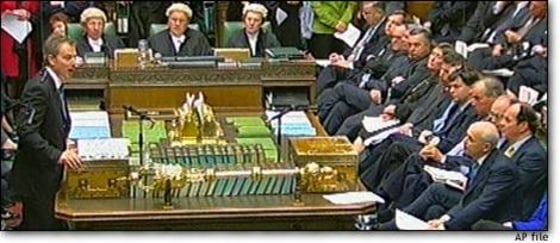Imagine an American president going to war with only 19 percent of the public on his side, and you can begin to fathom what British Prime Minister Tony Blair is up against. With a 42,000-strong British force deployed to the Middle East, Blair is approaching the outer limits of what any democratically elected leader may be able to sustain in terms of pursuing a policy at odds both with the general public and with key players in his own party.
Even as British troops in Kuwait gird for war, public support for the war is crumbling. In the United States, some recent polls show that the existence of a large U.S. force on Saddam Hussein’s doorstep has provided President George W. Bush with a bump in public support for a war even without U.N. approval.
Not so for Blair. Since September, when President Bush first challenged the United Nations to “enforce its own resolutions,” the proportion of those in Britain who say they oppose fighting without the Security Council’s sanction has remained steady at about 70 percent. Even with U.N. approval, only half of those polled approve of using military force to disarm Iraq.
U.N. diplomats say withering public support coupled with the threat of an outright revolt from within Blair’s Labor Party is driving Blair’s latest modifications to a U.N. draft proposal. The British demands include the destruction of biological and chemical agents that Baghdad still insists were destroyed already in the early 1990s, something that most observers see as an ultimatum that Saddam would never accede to.
“A lot of what you are now seeing in terms of British efforts at the U.N. is about domestic [British] politics, not international diplomacy,” says a U.N. diplomat who requested anonymity. “The proposals are very carefully drawn to appear substantive, but I think it is telling that none of them do anything that would upset the British-American war planning.”
A CHANGING LANDSCAPE
Until this week, questions about the political cost to Blair for his aggressive stance toward Iraq — a stance always out of step with the British public — generally revolved around longer-term considerations: diminished influence over his fractious Labor Party, lower marks in public approval polls and frayed ties with his European Union allies. Blair’s advisers hoped that this level of fallout would be survivable for the prime minister and would ultimately be more than offset by being on the winning side of a war that ousts Saddam.
Until this week, that is. Now, after the latest round of political opinion surveys in Britain showed that less than 20 percent of the public there favors Blair’s stance, and following the threatened resignation of one of Blair’s most popular Cabinet ministers, the prime minister finally has been forced to break ranks, at least publicly, with the United States in an effort to prove he is making every effort to win international legitimacy for the coming conflict.
LESS THAN IT SEEMS?
At the heart of Blair’s trouble are the changes he brought to the Labor Party. Once a sharply left-wing party, under Blair’s leadership it has become increasingly centrist, embracing markets and a forceful British foreign policy as it never did previously.
The “New Labor” of Tony Blair’s design, however, still includes a strong “Old Labor” faction that resents that move to the center, that yearns for the renationalization of many industries, opposes the existence of a standing British military and in the case of the buildup to war, regards Bush as more of a threat to world peace than Saddam.

On top of that disaffected left segment of his own party, players like Clare Short, the secretary for international development, are also threatening to abandon Blair. Often referred to as the “conscience” of Blair’s government, Short strongly supported Blair’s hawkish position in Kosovo as well as his decision to send British forces into Sierra Leone in 2000 to quell a bloody civil war.
Now she is threatening to resign. Short, like many others in Britain, also fears that the net result of the diplomatic standoff will be the permanent diminution of the U.N. Security Council, one of the few global forums where Britain holds power as a permanent member.
BLUNTING THE THREAT
Last month, Blair survived an attempt by 122 antiwar members of his Labor Party to overthrow him, winning a vote of confidence in Parliament thanks to support from the opposition Conservatives and Liberal Democrats. Most believe that these two parties, who could force new elections if they chose to vote against the prime minister, will be reluctant to do so right now with Blair about to lead the nation to war.
But stranger things have happened. Unlike the United States and other “presidential” democracies, in the British system, Blair could theoretically be replaced as Labor Party leader — and thus as prime minister — even without a vote in Parliament. During the run-up to the 1990-91 Gulf War, that is precisely what befell Margaret Thatcher, whose Conservative Party caucused and voted to replace here with John Major.
While Blair’s troubles appeared to come to a head this week, Blair has been in political trouble ever since he vowed to stand alongside the United States. The latest polls, paid for by the generally pro-Blair Times of London, show that the damage to Blair now extends far beyond foreign policy and into the Labor Party’s prospects for remaining in power. The Times poll found that, if an election were held now, Blair’s Labor would win 34 percent of the vote, the opposition Conservatives (also known as the Tories) would win the same figure, and the third-party Liberal Democrats would draw about 24 percent.
THE END OF A JUGGERNAUT?
Blair’s current crisis is particularly ironic considering that his initial popularity resulted in his enjoying landslide mandates from the voter that, literally, remade British politics. No British politician of the 20th century — not Winston Churchill, not Margaret Thatcher — ever approached the majorities that Blair brought with him to the House of Commons. (Currently, Labor holds 411 of the 659 seats). The conservative party, which ruled the country from 1982 until Blair’s election in 1997, had been powerless to oppose Blair’s wishes. Now, that legacy is in doubt.
Now Blair must stave off a revolt from within his party and hope that rebellious members will fear the prospect of a long stint in opposition more than the consequences of a war in Iraq. On the other side, he has to hope that the war goes quickly, that major civilian casualties are avoided, and that British forces don’t suffer severe significant troop losses. The last time British troops suffered a serious humiliation — in the Suez intervention of 1956 — the prime minister of the day, Anthony Eden, was forced by his party to resign.
Blair probably will avoid that fate. But for now, at least, it appears Blair’s decision to side with the United States in the Iraq debate has cost him control of his own destiny.
